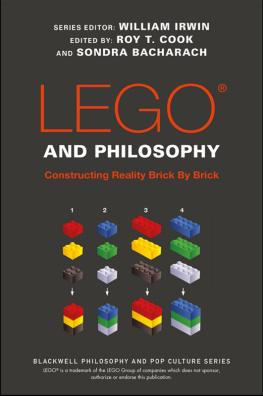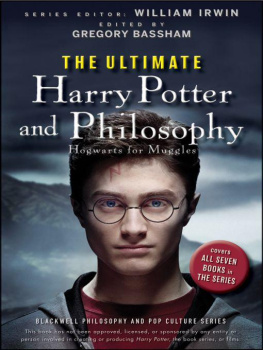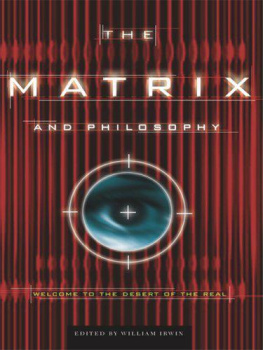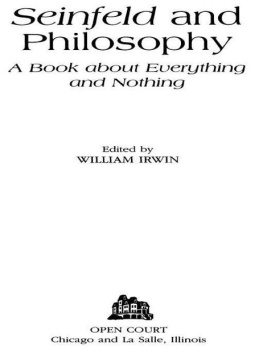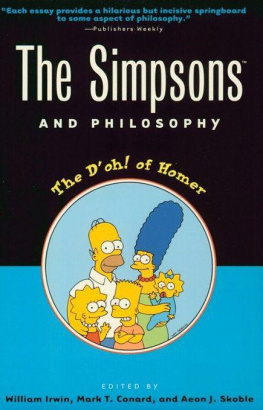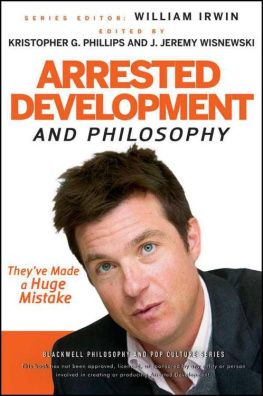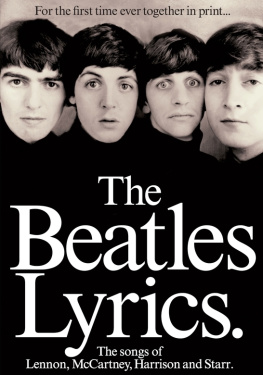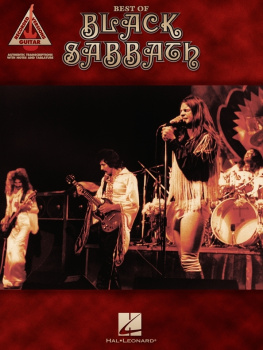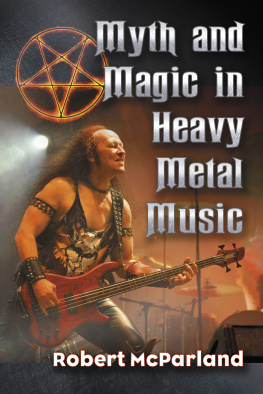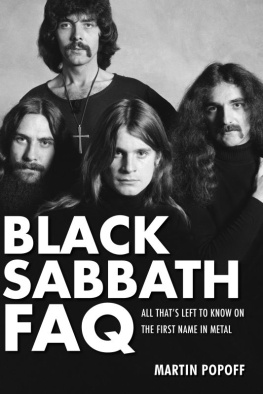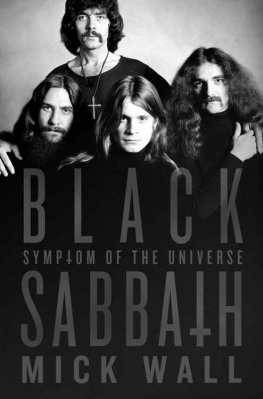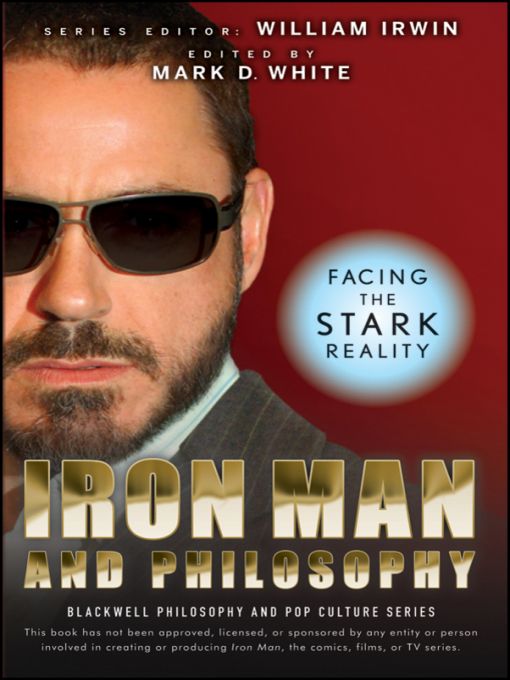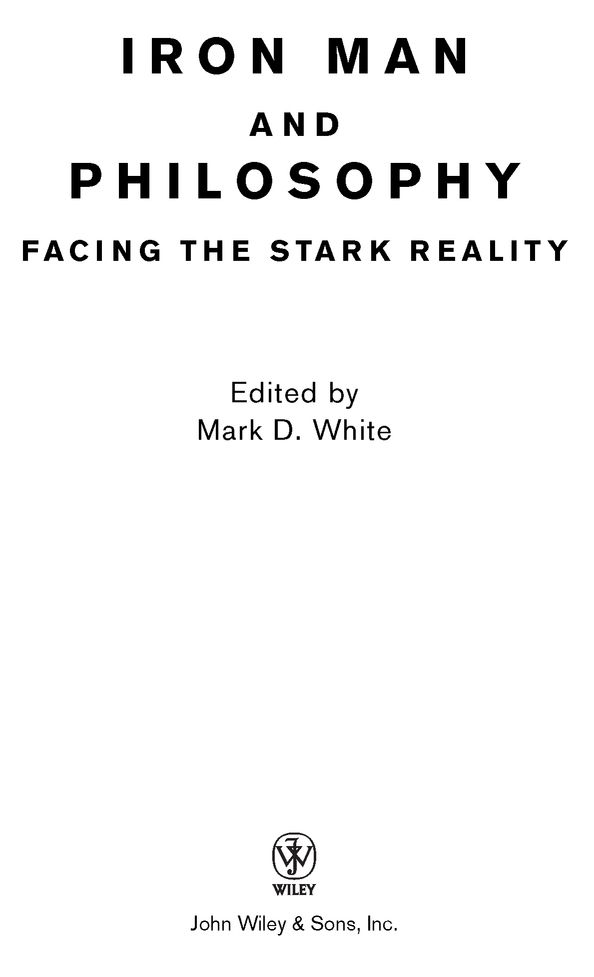Table of Contents
The Blackwell Philosophy and Pop Culture Series
Series Editor: William Irwin
South Park and Philosophy
Edited by Robert Arp
Metallica and Philosophy
Edited by William Irwin
Family Guy and Philosophy
Edited by J. Jeremy Wisnewski
The Daily Show and Philosophy
Edited by Jason Holt
Lost and Philosophy
Edited by Sharon Kaye
24 and Philosophy
Edited by Richard Davis, Jennifer
Hart Week, and Ronald Weed
Battlestar Galactica and
Philosophy
Edited by Jason T. Eberl
The Office and Philosophy
Edited by J. Jeremy Wisnewski
Batman and Philosophy
Edited by Mark D. White and
Robert Arp
House and Philosophy
Edited by Henry Jacoby
Watchmen and Philosophy
Edited by Mark D. White
X-Men and Philosophy
Edited by Rebecca Housel and
J. Jeremy Wisnewski
Terminator and Philosophy
Edited by Richard Brown and
Kevin Decker
Heroes and Philosophy
Edited by David Kyle Johnson
Final Fantasy and Philosophy
Edited by Jason Blahuta and
Michel Beaulieu
Twilight and Philosophy
Edited by Rebecca Housel and
J. Jeremy Wisnewski
IRON INTRODUCTIONS AND ARMORED ACKNOWLEDGMENTS
Strange how much I owe to my life-giving transistors! They not only power my Iron Man armor, but they keep my injured heart beating so that Tony Stark can remain alive! My very existence is hanging by an electric cord!
Well, enough philosophy for now! If I know my women, and nobody knows them better than Tony Stark...
Tales of Suspense #53, May 1964
Well, that may be enough philosophy for Tony Stark, but its definitely not enough for the contributors to the book youre holding, not to mention its humble editor. For nearly forty years, comics buffsand more recently, movie fanshave thrilled to the adventures of the armored avenger Iron Man and the romantic and business exploits of the man behind the mask, Tony Stark. But compared to other celebrated superheroes, Iron Man looks like a straightforward character. Tonys not a deeply tortured soul like Batman or a perennial outcast like each of Uncanny X-Men, and hes not a front for a harsh portrayal of abuse of power like the characters of Watchmen. Hes a guy in a shiny metal suit who fights bad guysso what can philosophers possibly say about him?
As it turns out, plenty! A certain webslinger we know is fond of saying that with great power comes great responsibility, and Iron Man certainly wields great powerbut does he show great responsibility? Does he behave ethically, and does he reason philosophically? Is there a downside to the tremendous technological advances that form Iron Mans incredible armor? And is his true superpower the armor of Iron Man or the intelligence of Tony Stark? Speaking of whom, Tony Stark is infamous for his playboy persona or, to put it more bluntly, his alcoholic womanizing. So how do these character flaws reflect on Iron Man the hero? Despite the glitz, glamour, and gleaming armor, is tragedy actually the defining aspect of Tony Starks life?
As you read this book, I hope you come to agreeif you didnt alreadythat even the most normal of superheroes can inspire fascinating philosophical questions. Stan Lee may not have realized it at the time, but when he took a brilliant, handsome, and wealthy weapons manufacturer and turned his life upside down, he created a character with enough inner and outer turmoil to inspire stories like Demon in a Bottle, Armor Wars, and The Mask in the Iron Man (just to name a few). And Iron Man has more than enough depth to inspire philosophers like usand that includes you, dear readersto think about power, responsibility, intelligence, virtue, technology, and just what it must feel like to soar into the sky with jet-powered boots. (Im still waiting for the last onesomeday!)

For shepherding this book through with ease and grace, I want to thank Connie Pepper Santisteban and Eric Happy Nelson at Wiley; none of the books in the Blackwell Philosophy and Pop Culture Seriesor our love triangle, so essential to the plotwould be possible without them. Heartfelt thanks go out to Robert Yinsen Arp, who helped get this ball rolling in the first place (and happily avoided the fate of his namesake). As always, I could not do this without the support and assistance of my copilot, series editor Bill Rhodey Irwin (could War Machine and Philosophy be next?). And finally, I thank all my fellow Avengers (as it happens, no West Coast onesgo figure) who contributed chapters to this bookI never could have defeated the evil Dr. Deadline without you!
For the years of Iron Man stories that inspired all of us involved with this book, we thank the creators, starting with Stan Lee, Larry Lieber, Don Heck, and Jack Kirby and continuing on with David Michelinie, Bob Layton, Denny ONeil, Joe Quesada, Warren Ellis, Daniel and Charles Knauf, and Matt Fraction. Let us not forget the folks who gave ol Shellhead even more worldwide exposure through the Iron Man films: Jon Favreau, Robert Downey Jr., and Gwyneth Paltrow, plus their costars, screenwriters, crew, and producers.
And thank you, Tony Stark. As the song goes, you get knocked down, but you get up againtheyre never gonna keep you down. And as long as they dont, well be there, reading the comics, watching the movies, and thinking about the philosophy.
PART ONE
THE NUTS AND BOLTS OF TONY STARK
THE STARK MADNESS OF TECHNOLOGY
George A. Dunn
For me, it was the jet boots.
Not that I didn t also covet that incredible array of weapons built into Tony Starks armorthe repulsor rays, missile launchers, pulse beams, and flamethrowersbut it was those jet boots that really got me salivating. To my preadolescent mind, it was Tonys marvelous ability to lift himself off the ground and soar through the clouds that made him a bona fide superhero and not just some hotshot engineer outfitted with an admittedly awesome arsenal of weapons. After all, the prefix super comes from a Latin word meaning above, so to watch a real superhero in action you should need to crane your neck and look up in the sky.
But the jet boots were also emblematic of what to my mind was the most glorious thing about Tonys way of being a superhero. Unlike, say, Reed Richards of the Fantastic Four, Tony wasnt simply someone who happened to be a superhero in addition to being a hotshot engineer. He was a superhero because of those jet boots and the enviable power they gave him, which is to say that it was his extraordinary engineering prowess that allowed him to make himself super, without having to wait around for gamma rays or a radioactive spider bite. Consequentlyand best of all, to my way of thinkingyou didnt even need to be Tony to wield his remarkable superpowers (at least until recently, when Extremis transformed him into a full-fledged technological artifact in his own right). All you needed was access to Stark technology. In principle, anyone could become the Iron Man. Of course, as the memorable Armor Wars story line drove home with a vengeanceand by vengeance, I mean Tony Stark in a murderous rageyou would be ill-advised to use that technology without the permission of its creator. On the other hand, you might get to be one of the lucky few, like James Rhodey Rhodes, Happy Hogan, or, more recently, Pepper Potts, all of whom Tony has authorized at one time to don some version of his Iron Man armor and take flight.


